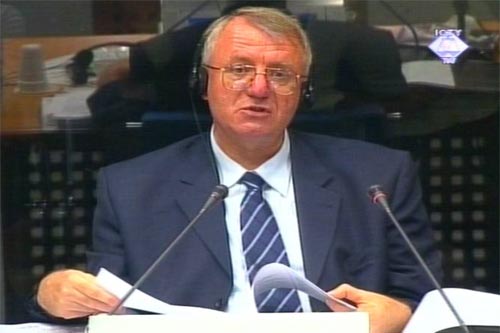Home
SESELJ "FOMENTS LOVE"
On the fifth day of his testimony at the trial of Slobodan Milosevic, Vojislav Seselj challenges the allegations made in several indictments issued by the ICTY that he "actively participated in the war propaganda and fomenting interethnic hatred:" Some of his statements were belligerent, if truth were told, but they did not constitute "institutionalized propaganda"; they merely reflected his "political style". Seselj thinks that attempts to deny that the Croat or Muslim nations exist is based on "scientific arguments" and cannot thus be considered as attempts to foment hatred
 Vojislav Seselj testifying in defense of Slobodan Milosevic
Vojislav Seselj testifying in defense of Slobodan Milosevic Vojislav Seselj did not foment interethnic hatred: quite the contrary, he "fomented love and tried to convince the people that used to be parts of the Serb nation that they were Serbs too and that the brotherly accord and unity among Orthodox, Catholic and Muslim Serbs should be revived and a single state should be created."
This is how, on the fifth day of his testimony at the Milosevic trial, the leader of the Serbian Radicals challenged the allegations in several ICTY indictments that he "actively participated in the war propaganda and fomenting interethnic hatred." He did admit that many of his statements were belligerent, claiming that they did not constitute "institutionalized propaganda" but merely reflected his "political style." His denying the existence of the Croat or Muslim nation is based on "scientific arguments" and thus cannot be considered as attempts to foment hatred.
Today Seselj mostly spoke about the relations he and Milosevic had with Radovan Karadzic, Momcilo Krajisnik, Biljana Plavsic and Ratko Mladic. According to the indictment, they all participated in the joint criminal enterprise in Bosnia and Herzegovina.
According to Seselj, Milosevic and Karadzic "were never on the same ideological wavelength, and thus could not participate together in the same joint criminal enterprise”. Karadzic was "a nationalist and an anti-communist": together with the SDS and SRS he advocated the "rehabilitation of the Serb Chetnik movement." On the other hand, Milosevic is "a former communist who remains a leftist." Seselj described his relations with Karadzic as "friendly", noting that the Bosnian Serb leader was "much closer to Djindjic and Kostunica" and also formed a coalition with Vuk Draskovic's SPO in Bosnia.
In June 1996, as Seselj testified today, Radovan Karadzic told him that the Serb forces "did not expel the Muslim civilians from Srebrenica," that they had left "at their own insistence," on the basis of an agreement signed by a Dutch Major representing the refugees and Miroslav Deronjic on behalf of the Serb side. Karadzic also told him, Seselj claims, that "no one ordered the execution of the prisoners," but that "about 1,000 people were executed when things got out of control." He told Seselj he suspected foreign powers had been involved in that, adding that many Muslims got killed as they tried to break through the Serb lines and in clashes between those elements that wanted to surrender and those who refused to do so. Seselj claims that the list of people killed in Srebrenica includes "the names of Muslims who were surrendered to the Bosnian Serbs in 1992 by Milo Djukanovic, and were subsequently executed by Miroslav Deronjic."
Seselj described his relations with Momcilo Krajisnik as "much better" than those with Karadzic since the speaker of the Bosnian Serb Assembly "was much more supportive of the Serbian radical party" than Karadzic. As for Biljana Plavsic, Seselj said she had held "intolerably extremist views" which bothered even him. He described how in 1996 he had tried to persuade Karadzic not to run for the president of RS, but Karadzic had done it anyway, just to spite the international community which had been trying to remove him from the scene by any means available. Another reason why he ran was to "strike a blow against Milosevic".
Seselj "did not have any proper contacts" with Ratko Mladic, as he said: there were just two or three chance encounters in Belgrade.
Milosevic edded that by his questions about Seselj's relations with the Bosnian Serb political and military leaders he is trying to show that neither he nor the witness "had anything in common with the people alleged to have participated in a joint criminal enterprise with them." Judge Bonomy however noted that "one can be in a joint criminal enterprise with people one has never met."
Milosevic said today he would need three more days to finish examining the witness, which means that Vojislav Seselj's cross-examination will begin next week.
Linked Reports
- Case : Milosevic Slobodan - "Kosovo, Croatia and Bosnia"
- 2005-08-25 LARGER, NOT GREATER SERBIA
- 2005-08-24 SESELJ VILIFIES DRASKOVIC AND DJINDJIC
- 2005-08-23 WILL MILOSEVIC BENEFIT FROM SESELJ'S TESTIMONY?
- 2005-09-01 SESELJ MALIGNS POTENTIAL WITNESSES
- 2005-09-05 SESELJ’S WAR IN SARAJEVO
- 2005-09-06 JUDGES GET TO KNOW "THE REAL SESELJ"
